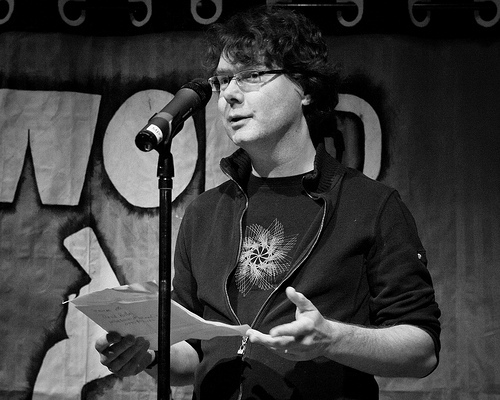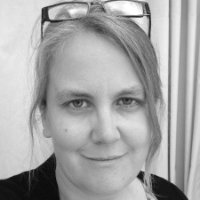
Jonathan Taylor is an author, lecturer, editor and critic. His books include the novels Melissa (Salt, 2015), and Entertaining Strangers (Salt, 2012), the memoir Take Me Home: Parkinson’s, My Father, Myself (Granta, 2007), and the short story collection Kontakte and Other Stories (Roman, 2013 and 2014). He teaches Creative Writing at the University of Leicester. He lives in Loughborough with his wife, the poet Maria Taylor, and their twin daughters, Miranda and Rosalind.
His website is www.jonathanptaylor.co.uk.
1. Your novels have been published by Salt and a memoir by Granta Books. You also write short fiction. Do you have a preference and how does your approach to each of these differ?
I write in lots of different forms and genres – short fiction, novels, non-fiction and poetry. Part of the reason is that I get bored easily, and, once I’ve finished something, I want to do something totally different. In the short term, that means something totally different to writing – like getting drunk or cleaning the bathroom. But given that getting drunk and cleaning the bathroom are fairly transient pursuits, I eventually come back to writing, in a different form or genre.
So the short answer is no: I don’t have a preference for any of the forms. In fact, I think our culture overrates novels at the expense of other forms – and that short fiction and creative non-fiction are often unfairly overshadowed by the weird fixation on novels (much as, of course, I love the novel form). Short fiction is actually going through a real renaissance, I think, in Britain – the sheer variety and vitality of what’s being written in terms of short stories is wonderful. It’s much more diverse than it was when I first started writing short stories in the dark ages of the 1980s. As for poetry, I’m sceptical of the ways in which it is both marginalised by our culture, and marginalises itself: too often, it is dismissed as irrelevant to people, and too often what gets lauded within certain enclosed communities really is irrelevant, at least in part. The best performance poets understand this, and speak directly to people (and hence get massive audiences). There are so many ways in which so-called “page poets” could learn from performance poets (and no doubt vice versa). They shouldn’t be separate things.
So I love all the forms I write in. My approach to them doesn’t really differ, in that I do believe, ultimately, that the forms all overlap: short fiction has a lot in common with poetry, especially in terms of style; and, in a theoretical sense, it’s hard often to differentiate creative non-fiction from fiction. Again, writing poetry, for me, arose naturally from writing memoir: poetry is often a kind of fragmented (shattered) memoir form. At base, all forms of so-called “creative” writing are also kinds of storytelling (even lyric poetry, despite what people claim). Homer, after all, was a poet, a musician, a storyteller, a “novelist” (in a loose sense), a performer, and (again in a loose sense) a kind of non-fiction writer (in that he treats the stories as though they are “true”). The same might be said of Aeschylus, Euripides, Shakespeare: these writers do lots of different things at once. And Dickens is actually one of the greatest poets: there are passages of Dombey and Son which, though laid out as “prose,” constitute some of the most beautiful poetry ever written.
2. I really enjoyed the short fiction anthology, Overheard: Stories to Read Aloud. As an editor, do you focus more on line edits or on content and structure; is there an overall theme that you have in mind?
I’ve edited work in lots of different contexts, but for Overheard I’d selected the writers myself for the anthology (rather than putting out a general call for submissions) so I knew I’d get good stuff! It makes editing much easier, of course, when the basic material is excellent. I’m a fairly “interventionist” editor, which I know can by annoying; but I’d want the same for my own writing. You can’t entirely ever, on your own, make your writing as good as it could be, let alone perfect: I believe you always need external advice and suggestions from someone you trust. Sometimes, as you become more experienced, those critical voices are internalised – so you have editors in your head, as it were.
At the moment, I’ve just started thinking about co-editing a new short story anthology, with the wonderful writer Karen Stevens. The theme came first: we decided (over a lot of wine) that we wanted to put together an anthology of ‘Drinking Stories.’ There are, of course, strong traditions of ‘drinking songs’ and even ‘drinking poems’ in many cultures – but we want to show how there’s also a tradition of stories structured around the pleasures and pains of alcohol. Chekhov famously likened the short story to a shot of vodka – and there’s a real and metaphorical and structural relationship between the short story form and alcohol. There are stories about drinking, and there are also stories which simulate the effects of drinking (including a wonderful passage in David Copperfield). The relationship between storytelling and alcohol goes back to Chaucer and, in other cultures, even further.
Having said that the theme is the starting-point for editing, I think the important thing is to choose a theme in which the writers involved can do lots of different things. The whole point of an anthology is diversity – so you don’t want to make people write in the same way, or produce something uniform. That’s the readerly joy of an anthology, the unexpected, the tensions and conflicts as well as overlaps between the stories within.
3. Your work has been shortlisted for the East Midlands Book Award and the Saboteur Best Short Story Collection, and longlisted for the Not the Booker Prize. Overheard: Stories to Read Aloud won the Saboteur Best Fiction Anthology. What do you think makes good writing stand out, and is an originality of style essential?
Oh gosh, I’m going a bit red now. But honestly, awards and prizes – no one can deny that they’re pleasant – but ultimately they mean nothing. They are purely subjective attempts to impose order and hierarchy on a contemporary writing world which (in the best sense) is chaotic and multifarious and packed with thousands of wonderful, jostling books. In a way, prizes can be a way of denying that wonderful multifariousness and diversity, of impoverishing literary culture. I’m not saying that’s what they do – just that that’s the danger of them, and people end up just reading what they’re told (by awards, publishers, bookshops) to read, instead of discovering the huge variety of what’s actually out there, over the horizon. Perhaps some of the best books are over the horizon, out of sight, hidden from public view. One shouldn’t just read what one is “told” to read – one should also read at random, books one happens across, books discovered in corners, books from unfamiliar genres, books with pretty covers or intriguing titles.
Obviously, it’s a big question: what makes good writing stand out? I wish I knew. No doubt, in many ways, I’m a stylist, and I do think “originality of style” is of vital importance, maybe primary importance. Having said that, I’m not sure what “originality” would consist of in that respect. Still, there’s something beautifully musical about good writing – it should sound like music, either out loud or inside someone’s head. Short fiction and poetry in particular are, I think, musical forms at root, using rhythm, melody and interweaving voices (for example, in fictional dialogue) in a way not dissimilar to Bachian counterpoint. For that reason, good fiction (I think – but what do I know?) is a place in which, as Mikhail Bakhtin might have said, different voices, tones, registers meet, interweave and clash.
Perhaps that’s one reason why the writing I love the most mingles comedy and tragedy, horror and beauty, laughter and pathos, sometimes in the same sentence. I’m currently writing an academic book about laughter and its close relationship with horror and violence in the work of nineteenth and twentieth-century writers like Poe, Dickens, Carlyle, Wyndham Lewis, Edmund Gosse, Shirley Jackson.
4. Where did your writing journey begin?
When I was ten I gave up wanting to be a train driver, Prime Minister, astronaut or James Bond and decided to do something much more difficult – that is, become a writer. It was only many years later that I realised – in retrospect – that this was, coincidentally or not, the same moment that my father started getting ill. Eventually, he was diagnosed with Parkinson’s disease and an associated form of dementia. I wonder now if storytelling (and writing) is always about loss, or, to be more specific, always a poor replacement for a something which has been lost. In my case, it was an unconscious substitute for lost memories and histories. This is not to say that all writing and storytelling are forms of nostalgia – just that they are signs of a Fall, a lost world, fracture. That’s why so many writers are in exile, literally or metaphorically. In a wider sense, I think consciousness in general – which is, in the end, a kind of storytelling – is the result of loss, fragmentation, splitting. And that’s why, for many people, their earliest memories involve getting lost, or being separated from their parents. One of my earliest memories is of wandering round a big department store in Stoke-on-Trent, searching for Father Christmas. I didn’t find him, and ended up losing my parents as well. There’s some kind of allegory for life and writing hidden there.
5. As a Creative Writing Lecturer, how much can good writing be taught, or is it more a case of feeding a gift that has already taken root?
As I’ve said on many an occasion, I believe all aspects of writing can be taught – or, at least, learned, which might be a slightly different thing. I suppose I’m a nurturist, and believe that there is no such thing as a “gift” in writing – nothing, as far as I’m concerned, which might be termed “natural.” This may be different for maths or music, where child prodigies do sometimes occur, but writing is an entirely artificial and learned activity. Hence why there are so few (if any) child prodigies in the field of writing.
Maybe all this comes from my own experience: I learnt to read and write very late (my father thought there was something wrong with me); and then it took me years, decades to develop my writing to the point of it being publishable (whatever that means). Each little step was painfully won. I’m amazed by some of the students I teach, who can write fabulously at 20: it took me years and years of effort to improve. And I’m not the only one – after all, many famous authors took to writing quite late (Joseph Conrad is an obvious example). Writing is crawling. Reading, by contrast, should be effortless: the writer puts all that effort in to make reading a straightforward pleasure for the reader. That’s one of the paradoxes at the heart of writing: writing is difficult, hard-won, in order to make reading a simple pleasure.
6. Can you tells us about your role as co-director of arts organisation and small publisher Crystal Clear Creators?
I set up Crystal Clear Creators in 2003 with Robin Webber-Jones. It’s an arts organisation which develops, records, produces, publishes and promotes new writing, both for radio and in print. We’ve done a lot of different things with it over the years – run workshops and courses, published anthologies and pamphlets, produced radio dramas and run short-term radio stations. So it’s all very varied. At the moment, CCC is involved as co-organiser (along with Nine Arches Press and the Centre for New Writing) of the bi-monthly Leicester Shindig, an open-mic poetry night which has become quite well known. Otherwise, I’ve had to step back from it for a couple of years – what with twins, a full-time job and my own writing, time is at a premium. Still, we’re hoping to run a new project in the next year or so, and relaunch the whole organisation. It’s a social thing as well: writing can be such an isolating activity, so working with other writers in forums like CCC breaks you out of that. Again, this is another paradox in writing: it’s a displaced form of communication, in which you speak to lots of people, but it originates (by and large) in a very lone activity. You write for readers, but you do so on your own in a shed or in front of a computer. Writing is a kind of displaced social activity – it’s an act of communication, a meeting place, on the page.





You must be logged in to post a comment.